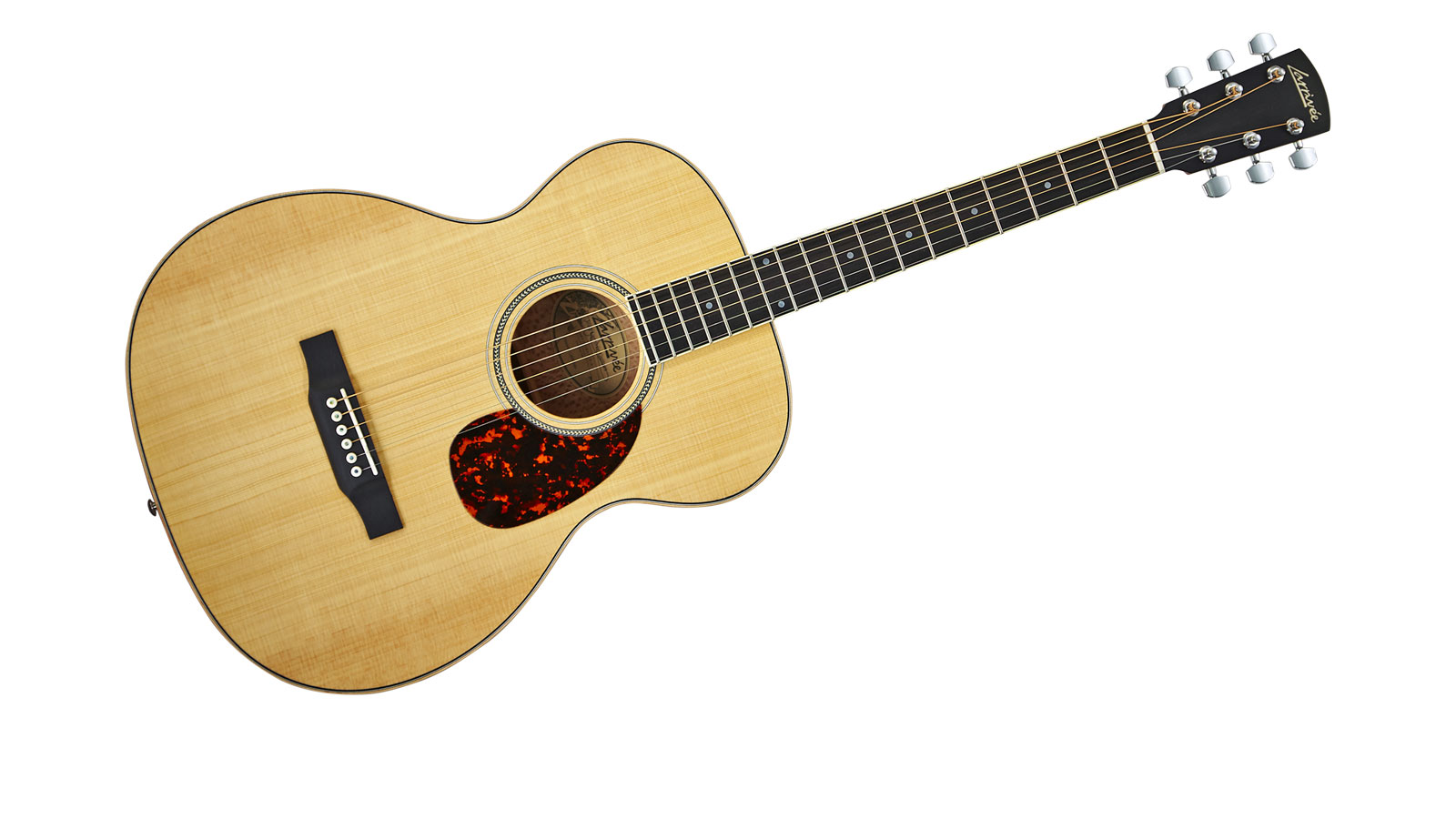MusicRadar Verdict
This is an exceptionally beautiful acoustic guitar that nails it in looks, sound, feel and playability.
Pros
- +
Beautiful build. Swamp ash looks great and sounds crisp and bright, with well-defined lows. Good value.
Cons
- -
Not a lot.
MusicRadar's got your back
More often than not, when a maker tries to introduce a 'new' wood into the recipe they face quite an uphill struggle to garner acceptance. Yet our initial play test on this Larrivée immediately makes you realise we might be missing something. The 14-fret OM-3 uses swamp ash for its back and sides. It's not highly figured, although the striped sides certainly have plenty of visual interest.
"In colour, the wood is a slightly darker version of maple, a little 'dirtier' looking, too"
In colour, the wood is a slightly darker version of maple, a little 'dirtier' looking, too. It's contrasted by dark chocolate-coloured rosewood binding around the body edges and a very subtle four-ply black and white purfling on the tops' edges.
Soundhole decoration is equally minimal: likewise, the simple dot fingerboard inlays and white brand logo on the headstock that's faced with rosewood, which is also used for fingerboard and bridge. In such an austere setting, the bevelled 'Tortis' pickguard assumes a central visual role.
Like a Taylor guitar, there is a slight ridge where the bound fingerboard meets the mahogany, but even that is so precise that it feels part of the design and is beyond criticism. These are factory-made guitars, like Taylors and the vast majority of affordable instruments out there, but both companies seem perfectly in control of the technology: not the other way around.
But where the brands differ - though both are made in California - is in price versus specification. Taylor doesn't choose to make an all-solid wood guitar at this price and if that's important to you, then Larrivée should be very high on your must-try list.
Sounds
With Larrivée's experience and such a considered design, 'perfect' is the correct word to describe the fingerboard, neck shape and setup, not to mention the precise intonation. The Tusq nut and compensated saddle is perfectly cut; string height is roughly 2mm on the high E and 2.4mm on the low E (measured at the 12th fret).
The neck has a mainstream C-meets-D profile (approximately 20mm deep at the 1st fret, 23mm at the 10th) with a little more shoulder perhaps than Taylor, and a subtly compound camber to the 'board that starts at 432mm to (17 inches) and flattens to 533mm (21 inches) by the top fret.
Want all the hottest music and gear news, reviews, deals, features and more, direct to your inbox? Sign up here.
"For players who make regular use of higher positions, a 14-fret guitar is a must"
The 44mm nut width allows a spacious 39.5mm string spread while the bride spacing, at 56mm, is equally airy. It's certainly fingerstyle friendly, but strummers and especially hybrid pickers shouldn't have any issues.
For players who make regular use of higher positions, a 14-fret guitar is a must. The 14-fret guitar sounds a little stretched and subtly thin in the lower frequencies, but it equates to a slightly bright sounding guitar which, when finger-picked in higher positions, sounds beautiful, almost ethereal.
The high end is spruce-crisp and breathy, and there's a papery texture to the sound, although we're still in new string territory. The clean lows will sit easy with kick drums and bass guitars, but it's down to you: your style and what you actually want (or need) to play.
You have a lot of choice for an all-solid acoustic like this, from quality and obviously more affordable Asian-made brands to the start-up models from USA giants - e.g. the recently introduced Martin 000RSGT, or Taylor's 312.
Larrivée may have a lower profile than those USA big boys, but don't for a moment think it's lacking. This guitar is a superb pro-level tool, very well-priced and offering something a little different in terms of the woods.
It is a very special musical instrument that any discerning amateur or professional should be happy to add to their collection.
Dave Burrluck is one of the world’s most experienced guitar journalists, who started writing back in the '80s for International Musician and Recording World, co-founded The Guitar Magazine and has been the Gear Reviews Editor of Guitarist magazine for the past two decades. Along the way, Dave has been the sole author of The PRS Guitar Book and The Player's Guide to Guitar Maintenance as well as contributing to numerous other books on the electric guitar. Dave is an active gigging and recording musician and still finds time to make, repair and mod guitars, not least for Guitarist’s The Mod Squad.

